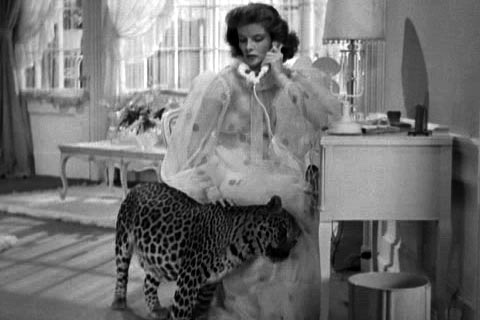
It’s possible that my perspective on Bringing Up Baby was colored by previous encounters with Katherine Hepburn. Not in-person encounters – instead, I’ve seen a number of Katherine Hepburns’ later films, like The African Queen or On Golden Pond, in which she played more serious roles; no-nonsense, forthright, kind of like a New England small town matron. Her early career, however, was very different – she was cast mostly as flighty free spirits in zany screwball comedies like this one. And that took a wee bit of adjustment for me. About twenty minutes into this film I turned to Alex with a gasp – “I just realized,” I marveled, “She’s playing a manic pixie dream girl.”
In fact, her role in this film is considered one of the earliest examples of the trope. And that’s fine – if you like manic pixie dream girls.

This particular MPDG is Susan Vance, a flighty heiress who first crosses paths with David Huxley (Cary Grant) on a golf course. Huxley is a paleontologist in search of funding for his museum, and is out on the links with Alexander Peabody (George Irving), lawyer for a potential donor. But his pitch is interrupted by Vance, who inadvertently and carelessly steals first Huxley’s ball – and then his car. Huxley flees in pursuit – and when he finally manages to convince Vance that she’s got the wrong car, she’s so remorseful that she offers to help him get in good with Peabody again by dragging him to a night club Vance knows he frequents. Except that outing also goes awry. And so does the next one she thinks up, and the next; and before long, Huxley has gone from puttering amongst his fossil collection to dressing in a marabou-trimmed bathrobe and scurrying through Connecticut forests in pursuit of an escaped leopard named “Baby”.

Okay: the situations they get into are amusing. And both Hepburn and Grant – flexing his newly-earned “screwball comedy” chops after The Awful Truth – are good at embodying these two characters. My biggest hurdle, however, is that I’m personally annoyed by the Manic Pixie Dream Girl character trope in general. Not in the fact that it exists, mind you – in the very character itself. In this film, about half the scrapes Vance and Huxley get into happen because each time Vance talks so much about herself or the situation or Huxley or the weather or her aunt or her car or whattheheckever that she simply ignores Huxley’s attempts to explain exactly what the problem is with her latest scheme – and only after things have gone horribly wrong does Huxley finally get a word in edgewise and point out that “no, this is my car, not yours” or “no, I am not a zoologist” or “no, that was my golf ball, not yours” – to which Vance always responds, “well, why didn’t you say so sooner?” Huxley snaps at one point and stomps on her foot in an effort to distract her long enough to stop talking and let him speak already, and honestly, I can sympathize.
I freely admit, though, that this is a personal prejudice, much like my aversion to “idiot plots”. Interestingly, I also have a personal fondness for moments where a mild-mannered, buttoned-up fuddy-duddy gets increasingly flustered and pestered to the point that they finally completely lose it – and Grant repeatedly delivers that very thing. He even ad-libbed one such moment, in an exchange that became one of the film’s most famous.
And when Susan Vance isn’t being so….Susan Vance-y, Hepburn is a treat as well. Her fast-talking and blarney actually help at one point when she’s trying to talk herself and half the cast out of a jail sentence (looooong story), and it’s utterly believable when she singlehandedly wrestles a leopard into submission (another long story). She’s good at what she does. It’s just that what she has to do happens to be something that bugs me. I can’t fault her for that, however.

Critics and audiences of the time seem to have had similar mixed opinions. Some praised the freewheeling film and thought both actors a delight; others were annoyed. Hepburn bore the brunt of the negative impact, being labeled “box office poison” for a couple years when the film flopped. Which hardly seems fair, since Grant also was in the film, and she was just doing what was in the script. But any critical affect seems to have been short-lived – only two years later, Grant and Hepburn teamed back up again for The Philadelphia Story, another screwball comedy outing that fared much better all around.






Pingback: Movie Crash Course: The Philadelphia Story | WadsWords
Pingback: The Philadelphia Story (1940) – The Movie Crash Course